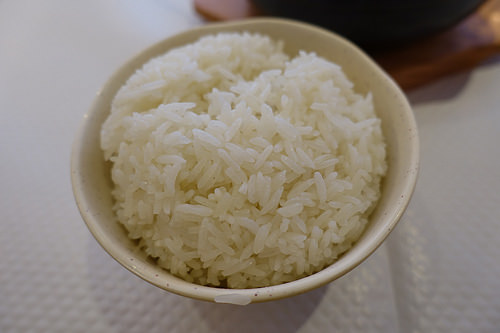One of the leading and most important food crops in the world is rice. Among most Filipinos, it is considered as the staple food and is an integral part of every household during meal times. In celebrating 2013 as the National Year of Rice, we have to push ourselves to become more responsible rice consumers and try our best to reduce rice wastage in order to achieve our country’s goal of becoming self-sufficient in rice.

Extending the Life of Cooked Rice for Later Consumption
As early as breakfast time, rice is already cooked and prepared for our tables. Sadly, there are times when cooked rice is not all consumed resulting to leftovers. This leads to retrogradation in rice which occurs when cooked rice becomes firm upon cooling and storage. Retrogradation then is what prompts people to reheat the rice in trying to restore its eating quality.
In finding a way to control retrogradation and extend the shelf-life of cooked rice, Dr. Maria Patricia V. Azanza and Ms. Jennibeth Paglinawan of the University of the Philippines Diliman embarked on a study to assess retrogradation control in grains of Japonicarice cultivars. The study, Retrogradation control in acid-pasteurized Japonicarice cultivars,” bagged the silver award during the 24th National Research Symposium (NRS) of the Bureau of Agricultural Research (BAR).
The study showed the potential of acid-pasteurized technology which allows cooked rice to be consumed much later even without reheating. It used Japonicarice cultivars, namely, Kantoand Jasponica which have low apparent amylose content, low gelatinization temperature, and soft to medium gel consistency. According to the International Rice Research Institute (IRRI), it is these three chemical characteristics that determine the quality of cooked rice. Amylose content determines moistness and stickiness of the rice grain. Gelatinization temperature tells how long the rice needs to cook. Gel consistency tells how hard the rice will become when it cools down. Based on literatures, Kantoand Jasponica possess grain characteristics which indicate lesser tendency to retrograde.
The two rice cultivars were each subjected to steeping and cooking solutions which contained acidic carbohydrates, ?-carrageenan and carboxymethyl cellulose (CMC), tartaric acid, and palm olein oil. After boiling the acidified rice, these were placed in pouches, sealed, pasteurized in boiling water, and then stored at ambient conditions (temperature of 28°C + 2°C), without reheating, for three months. After 12-weeks of storage, the acid pasteurized rice samples were tested for pH level and water activity (Aw), and analyzed through descriptive sensory evaluation.
Benefits for the Human Population
Results of the study reveal that with a maintained pH value < = 4.00 and water activity of Aw <= 0.85, the acid pasteurized rice samples were perceived to have no sour taste and therefore safe for human consumption.
As for the sensory analyses, five regular rice eaters evaluated the changes in the textural and non-textural characteristics of the rice samples. The textural descriptors used to analyze each sample were: firmness, springiness (degree to which grains return to original shape after partial compression), cohesiveness (degree to which sample deforms rather than break), chewiness, and starchiness. On the other hand, non-textural descriptors include color, natural aroma, natural flavor, and sourness.
The textural profiles of the Kantorice sample were found to be almost the same as the freshly cooked rice even when stored for two weeks. It was firm, springy, did not form a cohesive mass, chewy, moist, and starchy. It retained its white color during the whole duration of the storage. Its natural rice aroma remained near distinct at two weeks’ time, but slightly decreased after 12 weeks. Its natural rice flavor also turned out to be slightly distinct.
Meanwhile, firmness, springiness and cohesiveness were observed to increase in the Jasponica rice sample. These changes in the textural parameters, according to previous studies, have been reported as events in the retrogradation of cooked rice during storage.
Based on these results, the acid-pasteurized Kantosample did not show retrogradation during the test storage. The quality right after it was cooked and after 12 weeks of storage were almost the same. Therefore, this rice cultivar can be a suitable raw material in the preparation of acid pasteurized rice products.
What does this tell us? This research on rice provides us with something new on the consumption of rice. In times of calamities such as floods, ready-to-eat, acid-pasteurized cooked Kantorice can be used as relief goods because it can last safely for a few months without need for re-heating. It can also be given as food ration to military people whose lives are always on the constant move and where cooking is considered to be an impractical task. It can also serve as a stable ready-to-eat convenience food for people who do not have the means to cook all the time.
“Success in research is attained when its social responsibility is realized.” This is the lesson that the authors of the study would wish to impart. Every research done should be looked at from a broader perspective and how its result can impact and benefit the entire human population. ###
———-
For more details, please contact Dr. Ma. Patricia V. Azanza, University of the Philippines Diliman through e-mail: mpv.azanza@gmail.com
References:
1. The chemical characteristics that determine the quality of milled rice. Retrieved 12 June 2013 from http://www.knowledgebank.irri.org/postproductioncourse/Additional/MilledRice/1._Chemical_characteristics_determining_quality.htm
2. Azanza, MPV. (2011). Retrogradation resistant shelf-stable cooked rice. Philippine Bureau of Patents-Intellectual Property Office, 2-2011-000408, October 3, 2011.
Source: Anne Camille B. Brion, BAR Digest April-June 2013 Issue (Vol. 15 No.2)






